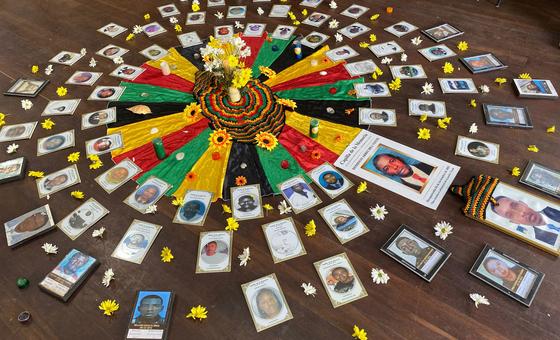Elizabeth Spehar, Assistant Secretary-General for Peacebuilding Support, addressed the Council’s high-level debate on the UN Secretary-General’s New Agenda for Peace.
Launched in July 2023, the policy brief shows how conflict prevention and peacebuilding can help to reverse the trend towards violence while reducing the human and economic costs of war.
Break the cycle
“Prevention and peacebuilding can break the cycle of violence and lay the foundations to ensure sustainable development is possible for all,” she said.
The meeting – convened by Sierra Leone, the Council president for August – was held against the backdrop of a rise in conflict globally.
Ms. Spehar outlined how investing in three areas can advance these goals, namely promoting and supporting national voluntary peacebuilding efforts, ensuring coherence, and strengthening partnerships and resources.
Support national efforts
Addressing the first point, she said A New Agenda for Peace underscores national ownership as a guiding principle for effective prevention and peacebuilding efforts.
“It also emphasizes the need to include diverse voices, needs and participation of all segments of society, which can help make peace more sustainable,” she added.
In this regard, she cited the example of the Central African Republic, where the UN Peacebuilding Fund has supported programmes to strengthen women community mediators, thus helping to prevent conflict and sustain peace at the community level.
Comprehensive approach to prevention
The second area for investment calls for ensuring coherence and a comprehensive approach to prevention and sustaining peace.
She said A New Agenda for Peace emphasizes the need to address the root causes of violence and conflict, not only the symptoms.
“The best way to prevent societies from descending into crisis is to ensure that they are resilient through investment in inclusive and sustainable development and inclusive governance,” she said.
“This is why A New Agenda for Peace calls for accelerating the implementation of the 2030 Agenda for Sustainable Development, and for tackling inequality, marginalization and exclusion.”
Partnerships and resources
The final area for investment requires strengthening critical partnerships and ensuring the availability of more resources for prevention and peacebuilding.
Ms. Spehar noted that partnership with regional and sub-regional actors has continued to grow in both importance and scope.
She described the regular engagements between the UN Security Council and the African Union Peace and Security Council (AUPSC), and a similar partnership between the UN Peacebuilding Commission and the AUPSC, as “promising”.
She insisted, however, that more can be done in terms of concrete follow-up and tracking the results of these meetings.
Military spending on the rise
Regarding resources, she said “it is worrying to see investments in peace and conflict prevention steadily decreasing while military spending is increasing worldwide”, which represent just a fraction of total Official Development Assistance (ODA).
She told the Council that last year, the proportion for the OECD (Organisation for Economic Co-operation and Development) countries was 10 per cent – a 15-year record low.
“At the same time, only last year, research showed that violence cost the world nearly $20 trillion – that is 13.5 per cent of global GDP.”
She stressed the need to further explore the partnership between the UN and international financial institutions (IFI), ranging from the World Bank to regional development banks, to ensure that development investments contribute to lasting peace.
Lessons from Sierra Leone
Meanwhile, Sierra Leone’s trajectory from brutal civil war 22 years ago to peace today “stands as a beacon of hope and a testament to the power of commitment, dialogue, and inclusive peacebuilding,” said Hawa Samai, Executive Secretary of the country’s Independent Commission for Peace and National Cohesion (ICPNC).
The Commission was set up in 2020 as part of broader efforts to prevent, manage and mitigate conflicts. It has established peace coalitions, as well as early warning and response mechanisms, across all 16 districts in Sierra Leone.
“By engaging a wide range of local actors, the ICPNC ensures that peacebuilding efforts are grounded in the realities and needs of communities,” she said.
Staying pro-active
Ms. Simai noted that one crucial lesson from her country’s experience has been the importance of community-owned and driven conflict prevention, which helps to resolve conflicts before they escalate.
“A proactive, post-conflict, gendered and inclusive lens is vital for effective conflict prevention, and staying apolitical is crucial for accessibility and trust among all key players,” she said.
She added that “networking with national and international partners has proven to be a significant strength,” and urged governments and donors to recognise and support national peace infrastructure.
Security sector reform
Bankole Adeoye, African Union Commissioner for Political Affairs, Peace and Security, called the New Agenda “a crucial master plan to recalibrate the global peace and security architecture with greater emphasis on conflict prevention.”
He also highlighted the need to give greater focus to security sector reform and said direct assistance is being provided to AU Member States embarking on the process.
The AU has also developed framework guidelines for the disarmament, demobilization and reintegration (DDR) of former combatant to assist in designing and building institutional capacity for countries transitioning from conflict.
He said that post-conflict reconstruction and development is centered around a newly revised policy which was recently adopted by the AU Assembly, which also covers “youth inclusion, child protection and environmental sustainability as avenues to sustain and advocate for peacebuilding”.
He added that the AU Centre for Post-Conflict Reconstruction, located in Egypt’s capital, Cairo, is now fully operational, describing it as “a game-changer”.

